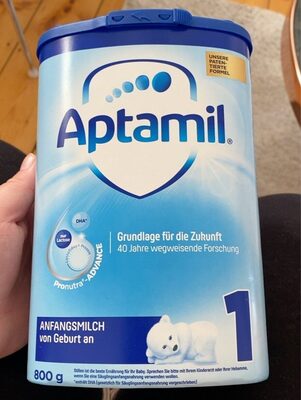
Barcode: 4056631001226
Aptamil 1 800g
DOUBTFUL
📝 Reason: This product includes religiously uncertain substances that could be Halal or Haram. Definitive classification requires more detailed production information.
🏷️ Category: Baby Foods, Baby Milks, Infant Formulas
📄 Certificates: Green Dot
Ingredients:
Details
Understanding the Halal Status of Aptamil 1 800g
Aptamil 1 800g is a popular product among parents seeking nutrition for their infants. However, its Halal status has been classified as ‘doubtful’, primarily due to the presence of certain ingredients whose sources are not clearly defined. In this article, we’ll delve into the detailed ingredients list and their respective Halal status.
What Makes a Product Halal?
In Islam, a product is deemed Halal if it complies with Islamic dietary laws. This means it should not contain any haram (forbidden) substances. Halal foods must also be prepared, processed, and stored separately from haram foods. This distinction is crucial for observant Muslims seeking to maintain their dietary laws.
Ingredient Analysis of Aptamil 1 800g
Let’s explore the ingredients that make up Aptamil 1 800g and assess their Halal status:
Common Ingredients
- Lactose (from milk): Permissible in Islam.
- Vegetable Oils (Sunflower, Coconut, and Rapeseed): Allowed under Islamic law.
- Skim Milk: Fully permissible.
- Whey Product (from milk): Halal compliant.
- Galactooligosaccharides (from milk): Permitted.
- Whey Protein (from milk): Halal friendly.
- Fructooligosaccharides: Generally acceptable.
- Fish Oil: Considered Halal.
- Potassium Citrate, Calcium Carbonate, Magnesium Chloride, Choline Chloride, Sodium Citrate, Sodium Chloride, Vitamin C: All permissible.
- Emulsifier (Soy Lecithin): Halal status confirmed.
Questionable Ingredients
- Oil from Mortierella alpina: Its Halal status is uncertain due to lack of detailed production information.
- Fructooligosaccharides: Lacks defined sources; Halal status may require further inquiry.
- L-Tryptophan: Ambiguous in Halal classification; needs more specifics about its sourcing.
- Vitamin E (E306): While mostly permissible, sourcing and extraction methods should be verified.
- Others (Vitamin D, K, etc.): Generally accepted, but sourcing is vital.
E-Numbers Breakdown
Understanding E-numbers can also help in deciding if a product meets Halal standards. The following E-numbers are present in Aptamil 1 800g:
- E511 – Magnesium Chloride: Salts & related compounds; Halal compliant.
- E508 – Potassium Chloride: Acceptable for Muslim consumers.
Brand and Certification Context
Aptamil belongs to the category of baby foods, specifically designed for infant formulas. The product holds a ‘Green Dot’ certification, indicating compliance with specific safety and recycling standards but does not specifically denote Halal compliance. This aspect signifies that while ingredients might be safe, the Halal status is still questionable due to uncertain elements in the composition.
Conclusion
In summary, Aptamil 1 800g presents a mixed bag for those concerned about Halal consumption. While many of its core components are certified Halal, some ingredients raise doubts, primarily due to unclear sourcing and the nature of production. It’s essential for consumers to gather sufficient information to make informed choices. For those strictly adhering to Halal guidelines, further research into the product’s origin and processing would be beneficial.
